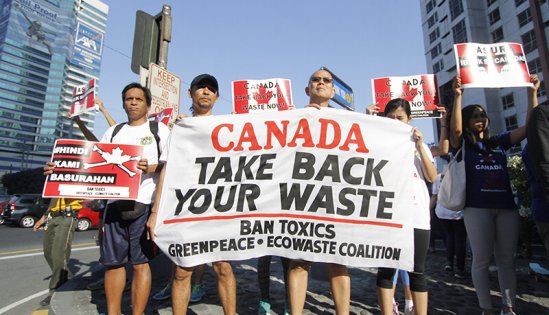|

Rev.
Fr. Robert Reyes joins environmental groups BAN Toxics,
Greenpeace and Ecowaste Coalition in a protest run, dubbed as
BasuRUN, along the streets of Makati Business District to demand
the immediate re-exportation of the 50 Canadian container vans
filled with hazardous wastes that continues to rot in the Port
of Manila. (AC Dimatatac/BAN Toxics) |
Running priest
leads BasuRUN against Canadian toxic waste
Press Release
March 10, 2015
MANILA – As the
illegal Canadian toxic wastes continue to rot in the Port of Manila
for over 600 days now, running priest Father Robert Reyes joined the
call for Canada to immediately re-export the illegal shipment, as he
and environmental advocates led by BAN Toxics, Ecowaste Coalition and
Greenpeace staged a “BasuRUN” in Makati City.
Reyes, a known environmental
and human rights activist, joined the groups on Tuesday as they ran
along the main streets of Makati City business district leading to
RCBC Plaza, where the Canadian Embassy is located, to decry the
illegal and ‘overstaying’ toxic shipment and to urge Canada to take
responsibility for their wastes.
“These toxic wastes are the
worst form of expressing friendship between our two countries,” Reyes
said. “Prime Minister Stephen Harper’s government is an embarrassment
to the civic-minded and environmentally conscious Canadians. We know
this is not the real Canada. We urge Prime Minister Harper to take
immediate action. Take back your illegal waste shipment now!”
On February 2014, the Bureau
of Customs (BOC) seized 50 container vans containing various waste
materials and hazardous wastes imported from Canada, with the
consignee Chronic Plastics, Inc. declaring the shipment as ‘assorted
scrap plastic materials for recycling’.
Canada’s stance, however,
pins the blame on the private consignee and maintains that it does not
have any legal capacity to compel the Canada-based exporter Chronic
Incorporated, to re-export their noxious shipment.
“It’s been more than a year
and yet we are battling the same problem. The Canadian government
won’t listen but they should, and we will not stop until they take
back the illegal shipment that they dumped in our country,” said Atty.
Richard Gutierrez, Executive Director of BAN Toxics.
Gutierrez said that the
shipment – containing a mixture of household and toxic wastes – should
be re-exported in accordance with the Basel Convention, an
international treaty that regulates toxic waste shipments. The Basel
Convention prohibits illegal toxic waste trade and requires the
exporting country, in this case Canada, to take back the illegally
seized shipment and to pay the costs for the return. Both Canada and
the Philippines are party to the Basel Convention.
The importation violates a
number of local laws such as the DENR Administrative Order 28 (Interim
Guidelines for the Importation of Recyclable Materials Containing
Hazardous Substances) and Republic Act 9003 or the Ecological Solid
Waste Management Act of 2000.
According to the groups’
calculations, the government is spending at least P144,000 a day for
the loss of income for storage space and the additional expenses for
demurrage, which, to date, costs around P87 million.
In an effort to gain public
attention on the issue, the coalition filed an online petition on
change.org that drew more than 25,000 signers, more than half of which
are Canadians. The group is encouraging more people to sign the online
petition to appeal and urge the Canadian embassy in the Philippines to
facilitate the pick-up and return of the garbage back to Canadian
soil.